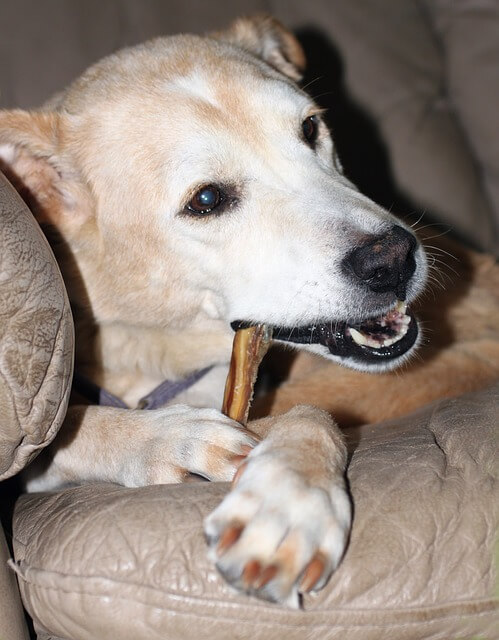Another common house training problem is submissive urination. In some ways submissive urination can be thought of as an opposite to territorial marking, because it occurs out of fear and submissiveness rather than aggressiveness and dominance.
What is Submissive Urination

Got A Chewing Dog?
Put an end to your Dog's excessive Chewing today with Daniel Stevens!
Submissive urination is an issue that can affect any dog regardless or age, breed, or gender, but typically younger dogs and females are the most likely to experience it. The affected dog tends to lose bladder control as a result of extreme insecurity or fear. A closely related problem occurs whereby a dog urinates out of extreme excitement. Often these problems occur during greeting the owner after a period of absence or any new arrivals to the dog's environment.
The signs of submissive urination are:
- submissive body language (crouched posture with lowered head, ears pinned back, tail between the legs)
- rolling over and exposing belly in submission
- urination occurs when the dog is being scolded, being greeted, meeting someone new
The problem, not surprisingly, is often associated with dogs that have been forcefully punished and / or abused by present or previous owners. In addition, males with strong voices can exacerbate the condition for some dogs that interpret the tone as a threat.
Dealing with Submissive Urination
The first step to take for owners dealing with a submissive urination problem is to tone down arrivals. Delay your greeting for a few minutes when you re-enter the home, and keep the greeting brief and controlled. Avoid petting your dog on the head or back in these situations as well. For any dogs but submissive ones in particular, it is best to pet them by approaching "underhand," keeping your hand visible to them instead of somewhere over them where they lose sight of it. This way they always know your intentions. Avoid direct eye contact as well, as this conveys dominance and challenge for a canine. In the short term, you may want to protect the area in which accidents happen, or arranging your return so that the dog can be outside when you greet her. Whatever you do, be sure that there is no correction or punishment for the dog, as this inevitably compounds the problem. It is entirely possible that submissive urination may resolve itself as the dog grows up and gains confidence. In the meantime, you can encourage and reward confident behavior.
Territorial marking and submissive urination can be dealt with promptly and carefully when they are properly recognized as special case house training problems.


